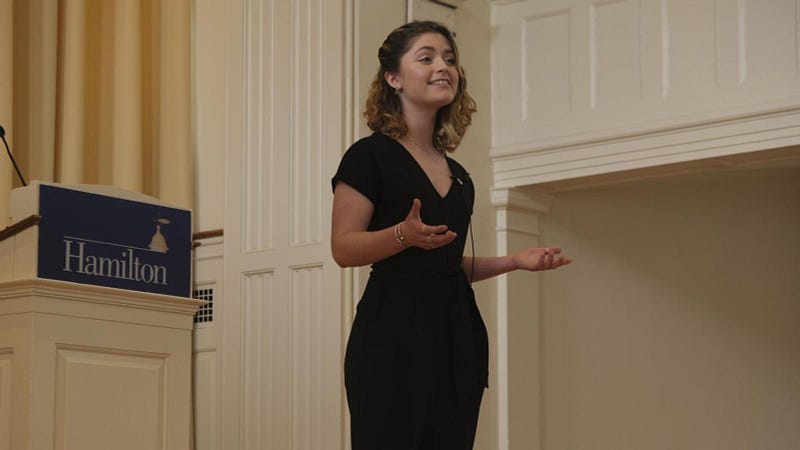by Rose Alarcon ’22, Staff Writer

On Saturday, March 5, the finals of the annual Public Speaking Competition took place at 1:00 p.m. in the Chapel, where three prizes were awarded. Open to some members beyond the immediate Hamilton community, the event was masked with the exception of the speakers when they took their turn on stage. According to the competition website, “each prize has a maximum speech length of eight minutes. Speeches should be planned and rehearsed. You may not use props, PowerPoint, or other aids, including in the form of clothing.”
The Oral Communication Center (OCC) hosted the event. Brooke Kessler ’22 and Peri Kessler ’22, who have worked at the OCC for three years, MC’d the event. All Hamilton students are eligible to enter and compete, but only eight students arrived at the finals.
The first competition was for the Clark Prize — only seniors were eligible to compete during this round. Unlike the other awards, this prize requires the addressing of a prompt, “What lesson(s) should we learn from the COVID-19 pandemic?” The two seniors who competed were Cherry Zhang ’22 and Jacob Hane ’22. Zhang ultimately won the prize with her speech entitled “How Productive Should I Be? Reflections on the Meanings of Work.” She used her speech to discuss the effect of capitalism on the significance of a person’s value. She emphasized how the pandemic taught her that there is more to life than work.
Five students competed for the McKinney Prize, which provides students with the option to speak about a topic of their choice. This prize was given in two installments to two students, the first for seniors and the second for underclassmen.
Abbie Wolff ’22 and Samantha Tassillo ’22 competed for this prize, with Wolff and her speech “Apathy and Access: Accessibility at Hamilton College” winning the award. The speech tackled the issue of accessibility on campus, showcasing both the problems and potential early solutions.
Joe Maalouf ’23, Tinashe Dylan Manguwa ’25 and Emma Reilly ’24 also gave speeches. Manguwa won the prize for his speech, “Here is Holy,” where he reflected upon his experience at Hamilton, concluding that “I’ve learned two things during my time here. Institutions are often dehumanizing and Hamilton is no exception. The second is one a former teacher of mine lent to me. Whatever institution I find myself in […] I should give myself permission to be fully there. To not conform to norms and questioning. As such the change I wish to see begins right here, where I am, in this space.”
The last prize was The Warren E. Wright Prize, which is only open to students who have taken a public speaking class at Hamilton. Unlike the other speeches, which were persuasive, this speech was meant to be informative. Following their performance, students were also required to field and answer two questions from the audience. Competitors were given two minutes to answer said questions.
The finalists were Wolff, Hane and Emilio Vicioso ’23. Wolff won her second award of the day with her talk titled “Reimagining Time and Space with Walkable Communities.” Her speech discussed a walkable city which is built with travel times in mind. She compares such spaces to “sprawling” American cities like Los Angeles, which are dependent on a car to travel anywhere.
Students can find more information about the Public Speaking Competition on the OCC website. This section contains a detailed breakdowns of the process of the competition, the different awards and recordings of past speeches. Both Kesslers encourage students to participate in this annual event as they “believe it is so important for students to showcase their public speaking skills and share with the Hamilton community issues and topics they are passionate about.”
















